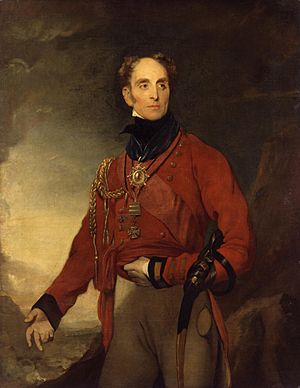Galbraith Lowry Cole facts for kids
Quick facts for kids
Sir Galbraith Lowry Cole
|
|
|---|---|

Portrait by William Dyce (1834)
|
|
| Born | 1 May 1772 Dublin, Ireland |
| Died | 4 October 1842 (aged 70) Highfield Park, Hampshire, England |
| Allegiance | |
| Service/ |
British Army |
| Years of service | 1787–1833 |
| Rank | General |
| Unit | 27th (Inniskilling) Regiment of Foot |
| Commands held | 4th Division Northern District |
| Battles/wars | Peninsular War |
| Awards | Knight Grand Cross, Order of the Bath |
| Other work | Governor of Mauritius 1823–1828 Governor of the Cape Colony 1828–1833 |
General Sir Galbraith Lowry Cole (born May 1, 1772 – died October 4, 1842) was an important British Army officer and a politician. He was born in Ireland and served his country in many ways, both in the military and in government.
Contents
Early Life and Family Connections
Galbraith Lowry Cole was born in Dublin, Ireland. His father was William Cole, 1st Earl of Enniskillen, a noble person in Ireland. His mother was Anne Lowry-Corry. Galbraith was the second son in his family.
A Life in the Army
Sir Galbraith Lowry Cole started his army career in 1787 when he was just 15 years old. He began as a junior officer, called a cornet, in the 12th Dragoon Guards. Over the years, he moved to different army units and quickly rose through the ranks.
He served in many places around the world, including the West Indies, Ireland, and Egypt. By 1801, he had become a colonel in the army.
Leading in Battle
A big part of his military career was during the Peninsular War (1808-1814). This was a major conflict where British, Spanish, and Portuguese forces fought against Napoleon's French Empire in Spain and Portugal. Cole was a key leader in this war.
He commanded the 4th Division under the famous Duke of Wellington. Cole showed great bravery and skill in several important battles:
- Battle of Maida (1806): He led the 1st Brigade in this battle in Sicily.
- Battle of Albuera (1811): He played a very important role here and was wounded.
- Battle of Salamanca (1812): He was seriously wounded in this battle, which was a big victory for the British.
For his bravery and leadership in these and other battles like Vitoria, Pyrenees, Nivelle, Orthez, and Toulouse, he received the Army Gold Cross with four clasps. This was a special award for his distinguished service.
By 1830, he had reached the highest rank of General. He also became the leader of the 27th Foot, a famous army unit.
Serving as a Politician and Governor
Besides his military career, Sir Galbraith Lowry Cole also served as a politician. He was a Member of Parliament (MP) in the Irish Parliament from 1797 to 1800. After Ireland and Great Britain joined, he became an MP in the British Parliament, representing Fermanagh in Ireland, starting in 1803.
He also took on important roles as a Governor:
- Governor of Mauritius (1823-1828): He was in charge of this island nation.
- Governor of the Cape Colony (1828-1833): He then moved to lead the Cape Colony in South Africa.
He was knighted in 1813 and received the high honor of Knight Grand Cross of the Order of the Bath in 1815.
Legacy and Family
Sir Galbraith Lowry Cole married Lady Frances Harris in 1815. She was known for her work in helping others, especially by working to teach useful skills to local children in the Cape Colony.
Several places are named after him or his family, showing his lasting impact:
- Colesberg: A town in the Cape Colony (now South Africa) is named after him.
- Sir Lowry's Pass: A mountain pass near Cape Town, South Africa, is also named in his honor.
- Enniskillen: In his hometown of Enniskillen, Ireland, there is a tall column with his statue on top, remembering his achievements.
He and Lady Frances had seven children:
- Colonel Arthur Lowry Cole
- Captain William Willoughby Cole
- James Henry Cole
- Florence Mary Georgiana Cole
- Louisa Catherine Cole
- Frances Maria Frederica Cole
- Henrietta Anne Paulina Cole
Sir Galbraith Lowry Cole lived at Highfield House in Hampshire, England, which was close to the home of his friend, the Duke of Wellington.
Images for kids
 | George Robert Carruthers |
 | Patricia Bath |
 | Jan Ernst Matzeliger |
 | Alexander Miles |


